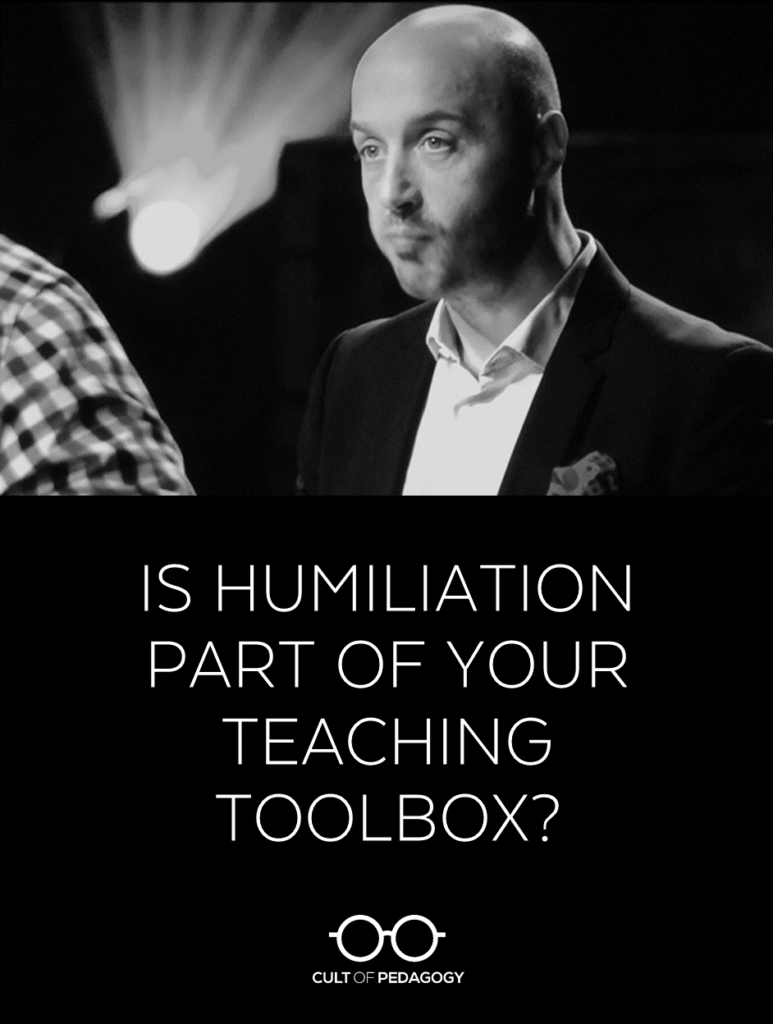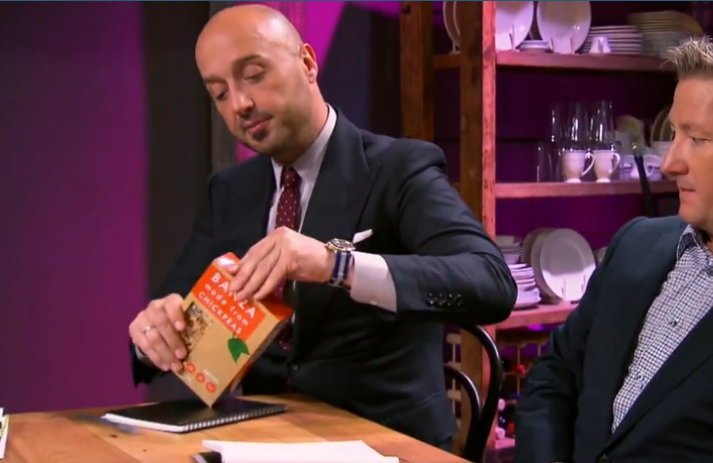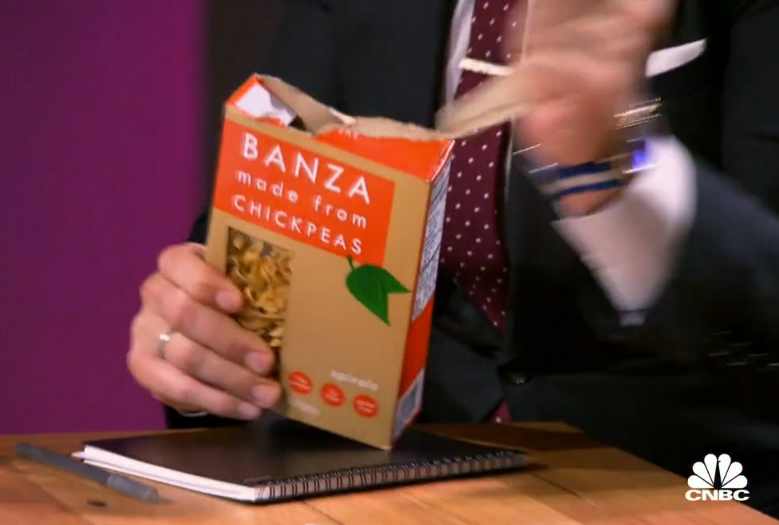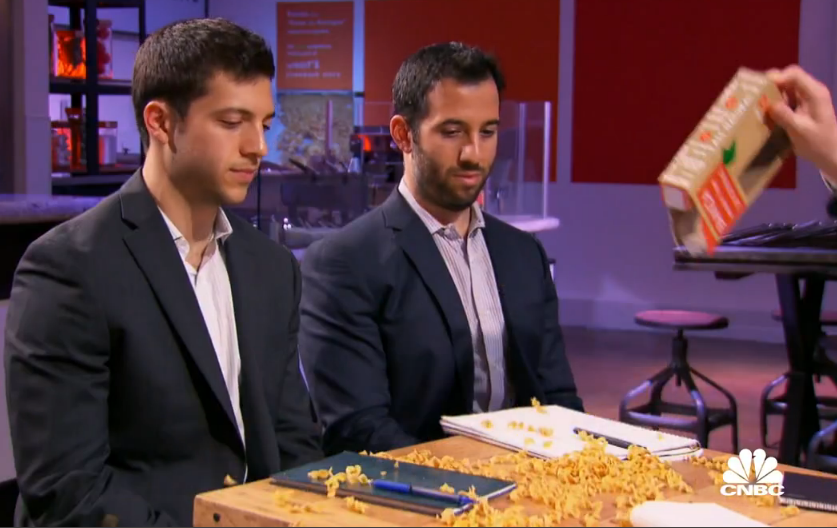Is Humiliation Part of Your Teaching Toolbox?

Image Source: Fox Broadcasting Company
I watch a lot of cooking competition shows. I started with Hell’s Kitchen, then moved on to MasterChef. And most recently, I’ve started watching CNBC’s Restaurant Startup. In the latter two, I have seen the weekly antics of a man named Joe Bastianich, a highly successful restaurateur whose conduct makes Gordon Ramsay’s tantrums look harmless.
Watching Joe lately has got me thinking about a certain kind of teacher.
Here’s the Bastianich method: While taking in a mouthful of the contestant’s food, he locks eyes with them—you can almost hear him thinking, “Give them the signature look, Joe.” If he doesn’t like the contestant’s food, he will berate them for it, calling it disgusting, telling contestants they should be ashamed. But that’s just basic, run-of-the-mill Simon Cowell fare; Bastianich goes a step further by getting physical.
I don’t mean that he physically hurts the contestants—he does stuff to their food, to the dishes they just spent the last hour carefully putting together, and by doing so he takes things to a whole new level of disrespect: He’ll pick up a forkful of risotto, hold it high in the air and let it dribble and spatter all over the plate like so much cow dung. He’ll smash a dessert to pieces, until it looks like roadkill. He’ll grab an entree and hurl it straight into the trash, smashing the plate in the process, just to make his point.
But it was this week’s Restaurant Startup that really did it for me.
In a meeting with two pasta entrepreneurs, a pair whose company he was just about to invest seventy-five thousand dollars in, Bastianich picked up a box of their pasta…
 Image Source: CNBC
Image Source: CNBC
tore it open…
 Image Source: CNBC
Image Source: CNBC
then, saying there was “no love in this box,” dumped the entire box of pasta on the table in front of them:
 Image Source: CNBC
Image Source: CNBC
Oh Joe. You are such a badass.
It makes for good TV, yes, and I’m sure his producers love it, but to me, it doesn’t look badass at all. It looks weak and cruel. Bastianich is in a position of power, he has money and success, and he abuses it by doing things he can only get away with because of that power. These two guys hadn’t done anything to deserve that; they were excited about their product and needed guidance about the best way to launch it. And in response, because he’s Joe Bastianich and that’s just how he rolls, he pulled a stunt like that.
Just gross.
So here’s my question for everyone who teaches, everyone who coaches, everyone who stands before another person in the name of mentoring or guiding or instructing them in any way: Are you a Bastianich? Do you ever behave in ways that are more about you than about your students? Do you overdo it, put on a big show, humiliate students for the sake of making a name for yourself? Because it builds your rep and makes students fear you? Because, in a sense, it makes for good TV?
Have you ever…
called a student’s question stupid?
read a student’s paper out loud to a class to illustrate a mistake (anonymously or not), and maybe gone too far in making fun of it?
cracked a joke about a student’s appearance?
revealed some aspect of a student’s personal life for the sake of humor?
torn a student’s paper or thrown it into the trash in front of them or other students?
thrown chalk or a marker or anything else across the room to get students’ attention?
assigned a punishment that would publicly embarrass a student, like wearing something silly or doing something embarrassing in a public place?
If this list sounds nothing like you, that’s a good thing. It means you hold your students’ hearts in high regard and would never do anything to hurt them. It also means you conduct yourself like a fricking grown-up. But many others might recognize themselves here, somewhere. Some of these behaviors are harsher than others, but all of them have one thing in common: They are motivated by our desire to communicate something about ourselves, to build our own reputation—a reputation for being funny, for being smart, for being “real,” for being someone not to be messed with.
Does humiliation work? Sometimes. It gets your point across. It stops undesirable behavior, at least in the short term. It most definitely teaches a certain type of lesson. And if you’re trying to prepare your students for an even meaner world, well, you’re no doubt accomplishing that.
But it doesn’t produce meaningful learning. In fact, it changes the subject altogether: When you humiliate someone, their focus moves away from the matter at hand. Instead of thinking about the long-term repercussions of not doing homework, about why they should not socialize at certain times, or even about why using raw flour in a sauce is a no-no, that student is now focused on how much they can’t stand you.
Now sometimes you get a student who you think deserves to be taken down a couple of pegs, to be put in their place, and public humiliation might really teach them a lesson. But I believe it is only a skilled few who can accomplish this with enough finesse that they actually help that student become a better person. And isn’t that what our goal should be, ultimately? If we are true masters of our craft, shouldn’t we be able to effectively shut down a disruptive student and maintain our own dignity? Shouldn’t we model the behavior we want to see?
I’m thinking yes. I’m thinking I don’t want that much adrenaline in my classroom. I don’t want the students with good intentions to be afraid of making mistakes because it means risking public ridicule, and I don’t want the rougher students experiencing yet another crappy role model, and contemplating ways they can beat me at my own game. I have had my Bastianich moments, but I’m pretty sure they came at a cost, whether I knew it or not.
So the next time you’re about to make that big gesture, throw that marker or shut a student up with one of your signature put-downs, ask yourself whether you’re doing it for the student or for yourself. Go into it knowing what you’re doing. Because sometimes, a pile of pasta is more than just a pile of pasta. ♦
If you found this article worth your time, I’d love to have you come back for more. Join my mailing list and get weekly tips, tools, and inspiration — in quick, bite-sized packages — all geared toward making your teaching more effective and joyful. To thank you, I’ll send you a free copy of my new e-booklet, 20 Ways to Cut Your Grading Time in Half. I look forward to getting to know you better!